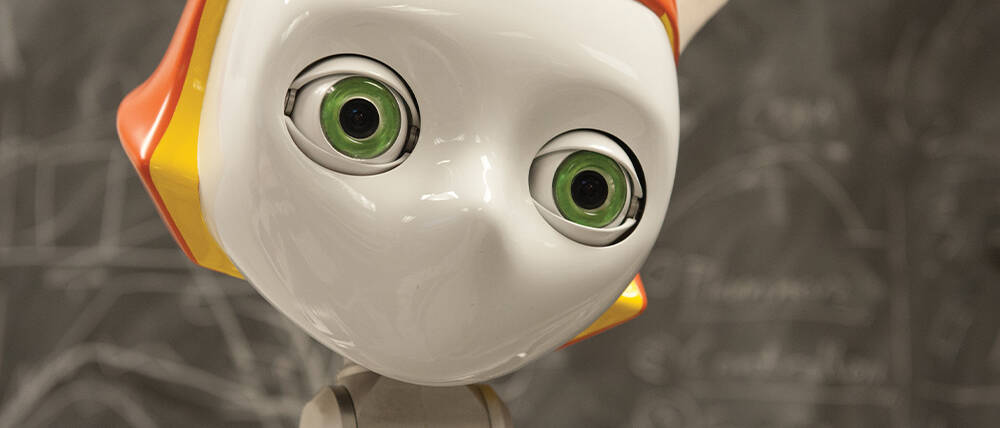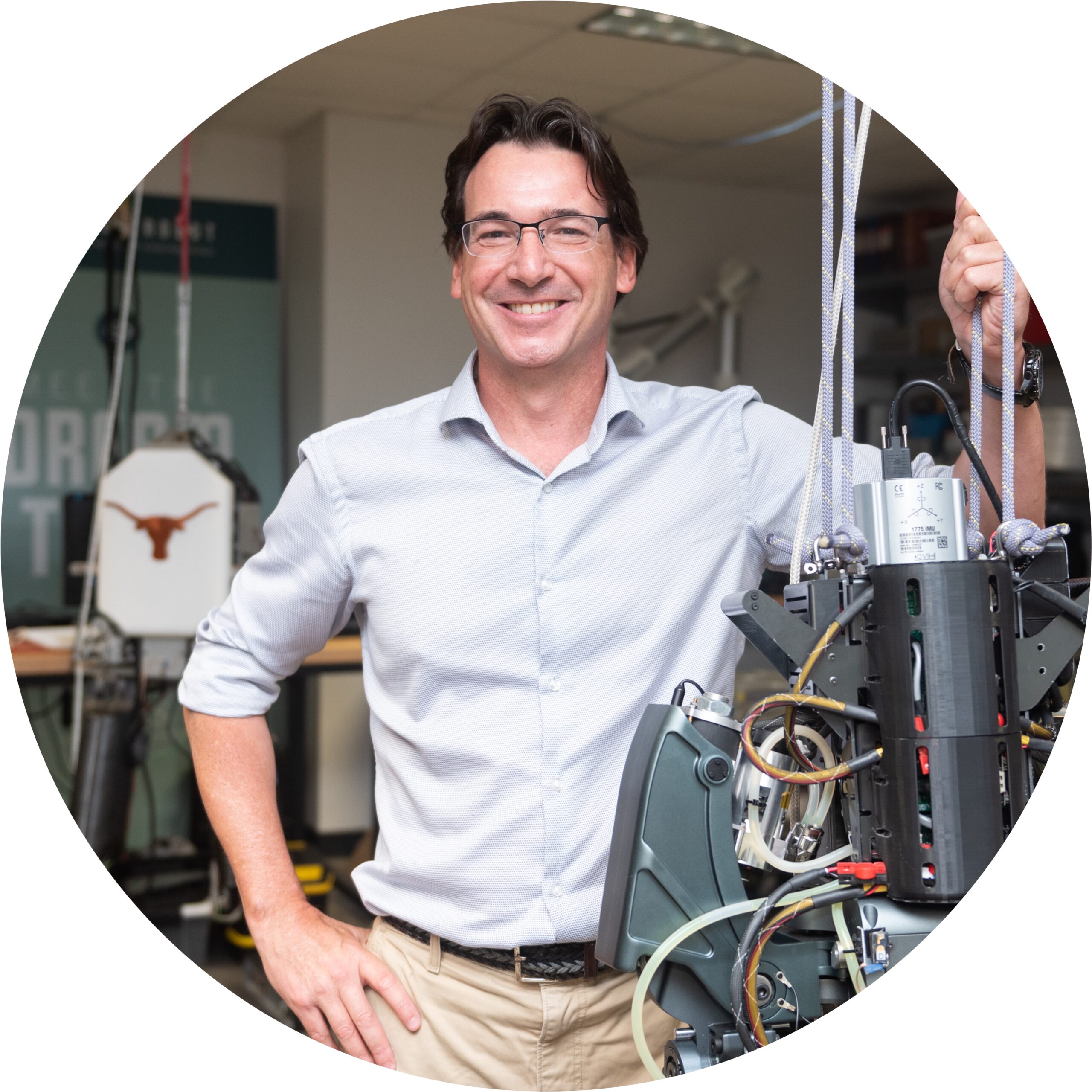UT Austin-Amazon Science Hub Robotics Research Symposium & Recruiting Expo

October 23, 2024
9:00 AM - 6:00 PM
Location: The University of Texas at Austin
Description
This public, day-long event will focus on research advancements in robotics. The symposium will feature technical talks, a robot rodeo and roundtable discussions with leading robotics researchers at UT Austin and Amazon.
Event Address
Engineering Education and Research Center (EER)
The University of Texas at Austin
2501 Speedway
Austin, TX 78712
DIRECTIONS/Parking/Rideshare
We recommend utilizing the Speedway Parking Garage. From there, walk south along Speedway, crossing Dean Keeton. Take a left (going east) to the EER 2nd floor Atrium. Once you enter the building, take the elevator down to the Mulva Auditorium on Floor 0. A campus map is also available.
Agenda for October 23, 2024
Breakfast, Registration and Networking
Mulva Foyer
Welcome Address
Mulva Auditorium

David Vanden Bout
Dean of the College of Natural Sciences, The University of Texas at Austin
David Vanden Bout is dean of the College of Natural Sciences and has served in the college’s administrative leadership since 2013. With research expenditures in excess of $110 million, the college spans campuses across Texas, including the Lady Bird Johnson Wildflower Center, the Marine Science Institute in Port Aransas and the McDonald Observatory in Fort Davis. He is the winner of multiple research, teaching and leadership awards, including an Alfred P. Sloan Research Fellowship, a Cottrell Scholar Award, a Research Innovation Award, a President’s Associates Teaching Excellence Award, a UT Regents’ Outstanding Teaching Award, the Precursor’s President’s Award and GlobalMindED’s Inclusive Leader Award.
Vanden Bout earned his B.S. in chemistry from Duke University in 1990 and a Ph.D in chemical physics in 1995 from The University of Texas at Austin. He went on to work as a National Science Foundation postdoctoral fellow in Paul Barbara’s laboratory at the University of Minnesota. He started as an assistant professor in the then-Department of Chemistry & Biochemistry at The University of Texas at Austin in 1997. He was promoted to the rank of associate professor in 2003 and the rank of full professor in 2013. He became the associate dean for undergraduate education in the College of Natural Sciences in 2014 and senior associate dean in 2019.
Recognition of Awards and Scholars
Mulva Auditorium

Darnell Moore
Principal Technical Program Manager, Amazon Consumer Robotics
Darnell Moore leads the Amazon Consumer Robotics’ Academic Partnerships practice. In every partnership, Moore seeks to grow participation from underrepresented groups and encourage the ethical development and application of technology. Before Amazon, he was a Distinguished Member of Technical Staff and Manager of Texas Instruments’ Perception & Analytics Laboratory (PAL), where he directed research for TI processors used in highly automated vehicles, unsupervised robots and pilotless drones.
Moore has been awarded several patents, published technical articles and chaired technical conferences and workshops. He has served as Dallas Regional Judge for the Commission on White House Fellows and is a lifetime member of the National Society of Black Engineers (NSBE), where he was recognized as the organization’s 2017 Distinguished Member of the Year. Moore is also a past president of The Dallas Assembly and recently served on the Board of Directors for the AT&T Performance Arts Center. Moore completed his M.S. and Ph.D. from Georgia Tech and his B.S. from Northwestern University, all in electrical engineering.

David Vanden Bout
Dean of the College of Natural Sciences, The University of Texas at Austin
David Vanden Bout is dean of the College of Natural Sciences and has served in the college’s administrative leadership since 2013. With research expenditures in excess of $110 million, the college spans campuses across Texas, including the Lady Bird Johnson Wildflower Center, the Marine Science Institute in Port Aransas and the McDonald Observatory in Fort Davis. He is the winner of multiple research, teaching and leadership awards, including an Alfred P. Sloan Research Fellowship, a Cottrell Scholar Award, a Research Innovation Award, a President’s Associates Teaching Excellence Award, a UT Regents’ Outstanding Teaching Award, the Precursor’s President’s Award and GlobalMindED’s Inclusive Leader Award.
Vanden Bout earned his B.S. in chemistry from Duke University in 1990 and a Ph.D in chemical physics in 1995 from The University of Texas at Austin. He went on to work as a National Science Foundation postdoctoral fellow in Paul Barbara’s laboratory at the University of Minnesota. He started as an assistant professor in the then-Department of Chemistry & Biochemistry at The University of Texas at Austin in 1997. He was promoted to the rank of associate professor in 2003 and the rank of full professor in 2013. He became the associate dean for undergraduate education in the College of Natural Sciences in 2014 and senior associate dean in 2019.
Technical Talk
Mulva Auditorium

Jong Jin Park
Principal Applied Scientist, Amazon
Jong Jin Park is a principal applied scientist in Amazon Lab126 working in home robotics. He is part of the team that launched Astro, the first consumer home robot from Amazon and was also part of the team for Proteus, the first fully autonomous mobile robot in Amazon warehouses. Before coming to industry, he received his Ph.D. from the University of Michigan, advised by now emeritus professor Benjamin Kuipers, for his work on graceful navigation for mobile robots in dynamic and uncertain environments.
Technical Talk: Zero-Shot, Ever-Improving Mobile-Manipulating Service Robots
Mulva Auditorium

Roberto Martin-Martin
Assistant Professor, The University of Texas at Austin
Roberto Martin-Martin is assistant professor of computer science at The University of Texas at Austin. His research connects robotics, computer vision and machine learning. He studies and develops novel AI algorithms that enable robots to perform tasks in human uncontrolled environments such as homes and offices. In that endeavor, he creates novel decision-making solutions based on reinforcement learning, imitation learning, planning and control, and explores topics in robot perception such as pose estimation and tracking, video prediction and parsing. Martin-Martin received his Ph.D. from the Berlin Institute of Technology (TUB) prior to a postdoctoral position at the Stanford Vision and Learning Lab under the supervision of Fei-Fei Li and Silvio Savarese. His work has been selected as RSS Best Systems Paper Award, RSS Pioneer, Winner of the Amazon Picking Challenge, and ICRA Best Paper, RSS and IROS Best Paper Nominee. He is chair of the IEEE Technical Committee in Mobile Manipulation.
Networking Break
Mulva Foyer
Panel: Human-Robot Interaction - Pioneering the Next Decade of Innovation
Mulva Auditorium

Luis Sentis (Moderator)
UT Austin Associate Professor & Co-Founder, Apptronik Systems
Luis Sentis is the general dynamics associate professor in Aerospace Engineering and Engineering Mechanics at The University of Texas at Austin. He is also a co-founder of the robotics company Apptronik Systems. He received a Ph.D. in Electrical Engineering from Stanford University and was a La Caixa Foundation Fellow. Sentis leads the Human Centered Robotics Laboratory, an experimental facility focusing on high-performance control, embodiment and intelligence of humanoid robots as well as strength augmentation exoskeletons. He publishes and teaches in areas related to real-time decision and control of human-centered robots, hardware design of high-performance humanoid robots, and safety capabilities for mobile humanoid robots.

Joydeep Biswas
Associate Professor, The University of Texas at Austin
Joydeep Biswas is an associate professor in the Department of Computer Science at The University of Texas at Austin, where he leads the Autonomous Mobile Robotics Laboratory. His research focuses on developing autonomous mobile robots that operate both cooperatively and independently in human environments, performing tasks accurately, robustly and reliably over extended periods. To achieve this, Biswas explores algorithms for perception, planning and control that enable robots to function effectively in unstructured, open-world settings, reason about their own competence and perform tasks beyond their initial programming. His work integrates techniques from probabilistic robotics, planning, machine learning, formal methods and human-robot interaction, with applications in various domains including service mobile robots, off-road driving and robot soccer.

Adam Fineberg
Senior Principal Engineer, Amazon
Adam Fineberg earned a B.S. in aerospace engineering and an M.S. and Ph.D. in electrical and computer engineering from Rutgers University. He has held academic and industrial roles in signal processing, machine learning, distributed and mobile operating systems and most recently was a founding member of the Amazon Consumer Robotics organization that developed the technology for Astro, Amazon’s social home robot. Fineberg has focused on Astro’s autonomous mobility and human-robot interaction and is currently investigating new robotics technologies and applications of AI.

Jin Joo Lee
Senior HRI Applied Scientist, Amazon Consumer Robotics
Jin Joo Lee is a senior HRI applied scientist at Amazon Consumer Robotics. Her expertise is in the research and development of believable robot characters, in-the-home proactivity and companionship. Prior to Amazon, Lee was a character AI engineer at the startup company Jibo. Lee earned her Ph.D. from the MIT Media Lab advised by Professor Cynthia Breazeal.

Peter Stone
Associate Department Chair & Director of Texas Robotics, The University of Texas at Austin
Peter Stone is the founder and director of the Learning Agents Research Group (LARG) within the Artificial Intelligence Laboratory in the Department of Computer Science at The University of Texas at Austin, as well as associate department chair and director of Texas Robotics. He was a co-founder of Cogitai, Inc. and is now Chief Scientist of Sony AI.
Stone’s main research interest in AI is understanding how we can best create complete intelligent agents. He considers adaptation, interaction and embodiment to be essential capabilities of such agents. Thus, his research focuses mainly on machine learning, multiagent systems and robotics. To him, the most exciting research topics are those inspired by challenging real-world problems. He believes that complete successful research includes both precise, novel algorithms and fully implemented and rigorously evaluated applications. Stone’s application domains have included robot soccer, autonomous bidding agents, autonomous vehicles and human-interactive agents.
Lunch with Table Topics
Location to be announced soon
Student Flash Talks
Mulva Auditorium

Ben Abbatematteo
Assistant Professor of Practice, The University of Texas at Austin
Ben Abbatematteo is an assistant professor of practice and postdoctoral fellow in the RobIn Lab at The University of Texas at Austin. His research focuses on robotic manipulation and reinforcement learning, aiming to develop physically capable, intelligent robots. He received his M.Sc. and Ph.D. degrees in computer science from Brown University, and his B.S. in biomedical engineering from the University of Rochester.

Jiaheng Hu
Ph.D. Student, The University of Texas at Austin
Jiaheng Hu is a third-year Ph.D. student at The University of Texas at Austin, co-advised by Peter Stone and Roberto Martín-Martín. His main research interest is in developing household robots that can learn and adapt autonomously in unstructured environments. Hu conducts research in robot learning and reinforcement learning, with a focus on their applications to mobile manipulation. He obtained his M.S. in robotics from Carnegie Mellon University, and his B.S. in computer science from Columbia University.

Zichao Hu
Ph.D. Student, The University of Texas at Austin
Zichao Hu is a third-year Ph.D. student in the Autonomous Mobile Robotics Lab (AMRL). His research focuses on code generation for robotics, social robot navigation and the application of generative AI in robotics.

Bo Liu
Ph.D. Student, The University of Texas at Austin
Bo Liu is a final-year Ph.D. student advised by Peter Stone and Qiang Liu, and will soon join Meta’s FAIR as a research scientist. He is interested in designing theoretically sound algorithms and neural architectures for training general-purpose AI. Liu has been working on lifelong/multitask learning, reinforcement learning, diffusion and flow-based generative modeling and optimizations.

Yunhao Yang
Ph.D. Student, The University of Texas at Austin
Yunhao Yang is a Ph.D. student in computer science at The University of Texas at Austin. He started his Ph.D. program in the fall of 2022. Prior to this, he received B.S. and M.S. degrees in computer science, and a B.A. in mathematics from UT Austin. He is currently a member of the Center for Autonomy, supervised by Ufuk Topcu. His research interests include integrating foundation models and formal methods for autonomy, AI safety and privacy.
Keynote: Automated Reasoning for Robot Control and Verification
Mulva Auditorium

Jim Kapinski
Senior Applied Scientist, Amazon Robotics
Jim Kapinski is a senior applied scientist with Amazon Robotics. He received his Ph.D. in electrical and computer engineering from Carnegie Mellon University in 2005, where he also served as a postdoctoral researcher from 2007 to 2008. Kapinski went on to found Fixed-Point Consulting, serving as president and leading projects for clients in defense, aerospace and automotive. From 2012 to 2019, as senior principal scientist at Toyota Research and Development, he spearheaded advanced research into verification and analysis of cyber-physical systems. Since 2019, Kapinski has applied his expertise in verification, controls and machine learning to solve challenges and drive innovation at Amazon Robotics.
Networking Reception
Mulva Foyer
Amazon Consumer Robotics & Texas Robotics: A Look Into an Industry/Academic Partnership
Mulva Auditorium

Adam Fineberg
Senior Principal Engineer, Amazon
Adam Fineberg earned a B.S. in aerospace engineering and an M.S. and Ph.D. in electrical and computer engineering from Rutgers University. He has held academic and industrial roles in signal processing, machine learning, distributed and mobile operating systems and most recently was a founding member of the Amazon Consumer Robotics organization that developed the technology for Astro, Amazon’s social home robot. Fineberg has focused on Astro’s autonomous mobility and human-robot interaction and is currently investigating new robotics technologies and applications of AI.

Peter Stone
Associate Department Chair & Director of Texas Robotics, The University of Texas at Austin
Peter Stone is the founder and director of the Learning Agents Research Group (LARG) within the Artificial Intelligence Laboratory in the Department of Computer Science at The University of Texas at Austin, as well as associate department chair and director of Texas Robotics. He was a co-founder of Cogitai, Inc. and is now Chief Scientist of Sony AI.
Stone’s main research interest in AI is understanding how we can best create complete intelligent agents. He considers adaptation, interaction and embodiment to be essential capabilities of such agents. Thus, his research focuses mainly on machine learning, multiagent systems and robotics. To him, the most exciting research topics are those inspired by challenging real-world problems. He believes that complete successful research includes both precise, novel algorithms and fully implemented and rigorously evaluated applications. Stone’s application domains have included robot soccer, autonomous bidding agents, autonomous vehicles and human-interactive agents.
Teaching a Robot Where to Park: A Scalable Crowdsourcing Approach
Mulva Auditorium

De’Aira Bryant
Postdoctoral Scientist, Amazon Consumer Robotics
De’Aira Bryant is a postdoctoral scientist at Amazon Consumer Robotics (Lab126). She earned her Ph.D. in computer science from the Georgia Institute of Technology where she worked as a graduate research assistant in the Human Automation Systems (HumAnS) Lab under the mentorship and advisory of Dr. Ayanna Howard. Her previous roles include a Research Scientist Intern on the Amazon Rekognition, Themis and Consumer Robotics teams in four consecutive summer internships and an Experience Design Intern at Adobe Design Research. Bryant was a recipient of the National Science Foundation Graduate Research Fellowship, the GEM National Consortium Fellowship, the Georgia Tech Sloan M.PhD Fellowship, and the Amazon Consumer Robotics Fellowship.
Bryant’s research areas include human-robot interaction, affective computing and AI ethics. Her professional mission is to contribute to projects that develop technology for social good.
Career Panel
Mulva Auditorium

Gerald Harris (Moderator)
Senior Program Manager, Amazon Consumer Robotics
Gerald Harris, a native of Little Rock, AR, is an educator and grassroots development professional with extensive experience in higher education and community engagement. With nearly two decades of experience in higher education, Harris has held key roles in student development, corporate and alumni engagement and institutional advancement at renowned institutions such as Rhodes College, Marquette University, Texas A&M University and Duke University. Currently, he serves as the Senior Program Manager for University Partnerships in Consumer Robotics at Amazon. In this capacity, he leads initiatives to educate, advocate for and empower the higher education community through research, student development and community outreach focused on robotics. Harris fosters partnerships and builds resources to redefine pathways to technical careers while developing talent pipelines across campuses nationwide.

Swetha Bijoy
Senior Manager of Software, Amazon Astro
Swetha Bijoy is a senior manager of software leading the experience platform for Amazon Astro. Bijoy has held key leadership roles in developing many Amazon products including Echo, Fire Tablet, Kindle, Ring and Astro. She has an extensive eleven-year background in software and hardware technologies. Before that, she worked at Adobe Inc. and CA as an engineer, learning new technologies and building a customer-facing suite of products in the Acrobat family and Creative Suite. Bijoy loves traveling and hiking outdoors with her family and spending time teaching her kids all her favorite board and card games.

De’Aira Bryant
Postdoctoral Scientist, Amazon Consumer Robotics
De’Aira Bryant is a postdoctoral scientist at Amazon Consumer Robotics (Lab126). She earned her Ph.D. in computer science from the Georgia Institute of Technology where she worked as a graduate research assistant in the Human Automation Systems (HumAnS) Lab under the mentorship and advisory of Dr. Ayanna Howard. Her previous roles include a Research Scientist Intern on the Amazon Rekognition, Themis and Consumer Robotics teams in four consecutive summer internships and an Experience Design Intern at Adobe Design Research. Bryant was a recipient of the National Science Foundation Graduate Research Fellowship, the GEM National Consortium Fellowship, the Georgia Tech Sloan M.PhD Fellowship, and the Amazon Consumer Robotics Fellowship.
Bryant’s research areas include human-robot interaction, affective computing and AI ethics. Her professional mission is to contribute to projects that develop technology for social good.

Marcelino Mendes de Almeida Neto
Robotics Engineer, Amazon Robotics
Marcelino Mendes de Almeida Neto is an experienced roboticist with a strong focus on developing advanced autonomous systems and robotic solutions across a variety of platforms. With a Ph.D. in aerospace engineering from UT Austin (2019), Almeida Neto’s expertise spans the full spectrum of robotics, from control theory to real-world implementation of autonomous algorithms. His professional career has been deeply embedded in robotics, with significant contributions to the development of robotic systems for both aerial and ground-based applications. His work at Amazon Lab126 involves simultaneous localization and mapping (SLAM), 3D gaussian splatting, sensor calibration and optimal exploration algorithms, among others.
Astro Demo & Robot Rodeo
Mulva Auditorium and EER Commons
Hosted by
This event is sponsored by UT Austin-Amazon Science Hub, a five-year partnership composed of representatives from UT and Amazon
